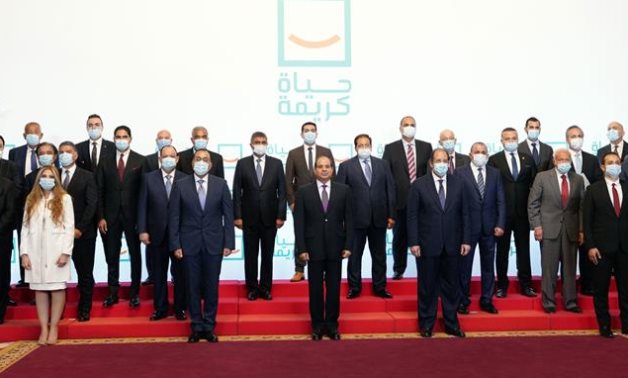
President Abdel Fattah El-Sisi met today with a group of Egyptian businessmen participating in “Haya Karima" (Decent Life) Initiative
CAIRO – 6 November 2024: Manal Awad, Minister of Local Development, opened the third day of the 12th session of the World Urban Forum in Cairo with a significant discussion on "Localization of Financing for Sustainable Development Goals and Local Financing." The session was attended by prominent global figures including UN Assistant Secretary-General and Executive Director of UN-Habitat Claudia Rosbach, Spain’s Minister of State for International Cooperation Eva Granados, World Bank Global Director for Urban Development and Resilience Ming Chang, along with various ministers, mayors, representatives from multilateral banks, and international organizations.
Awad emphasized the importance of the session, particularly in light of the urban development challenges faced not only by Egypt but worldwide. She expressed that the Egyptian government is committed to achieving the sustainable development goals, reflected in its efforts over the past decade, including massive infrastructure investments, balanced spatial development, and empowering local communities in alignment with Egypt's Vision 2030.
She stated: "Sustainable urban development does not rely solely on ambitious plans but also requires sustainable financing and robust local capacities." Dr. Awad noted that Egypt’s "Integrated National Financing Framework" is a critical step towards achieving sustainable development at the national level. This framework is designed to support long-term financing plans that ensure fair distribution of resources among Egypt’s governorates.
The minister outlined Egypt’s integrated national financing strategy, launched as part of a partnership between the Egyptian government and the United Nations, aimed at closing financing gaps and reducing future financial risks and debts.
This strategy is seen as an important tool for balanced development across the governorates, facilitating the construction of cities that meet citizens’ needs in terms of housing, infrastructure, and essential services. It also strengthens the capacities of local governments to implement effective development projects.
Egypt's government is focused on providing effective local governance to deliver public services efficiently. Through a series of reform initiatives, the government aims to enhance local planning and governance, particularly in urban areas, and ensure the integration of rural and urban development.
The government is working towards ensuring economic development and social justice across Egypt, particularly in less-developed regions. These initiatives are designed to ensure that all areas have equitable access to resources and opportunities.
Awad highlighted Egypt’s continuous efforts to empower local government units through cooperation with the private sector and international development partners. She emphasized the importance of attracting investments that will further support urban development, pointing out that Egypt’s government has launched several initiatives, such as social housing programs and urban development funds, to support these goals.
Additionally, Egypt is exploring non-traditional financing mechanisms in collaboration with the private sector, particularly in projects related to waste management and infrastructure. Dr. Awad also noted that the government is focused on updating planning systems to move away from traditional models toward programmatic planning for local services and facilities. This shift is expected to enhance the delivery of public services, improving both social and economic outcomes.
One of the major projects highlighted by Dr. Awad was the "Haya Karima" initiative (The Decent Life Project). This project aims to address the needs of Egypt’s most underdeveloped villages, focusing on infrastructure, employment opportunities, and the provision of essential services. The project is being implemented through partnerships with the private sector, civil society, and international development partners to create long-term solutions for rural development.
The minister also discussed the importance of integrated local development in achieving the country’s sustainable development goals. She emphasized that all of Egypt’s efforts are rooted in the principle that sustainable urban development begins at the local level. Therefore, local governance systems must be efficient and capable of managing resources and delivering services in a way that meets the needs of both rural and urban populations.
Awad concluded her remarks by emphasizing the importance of strengthening partnerships and developing financing solutions to address current challenges. She stated, "We have shown resilience and creativity in facing challenges over the past decade, and through collaboration and partnerships, we can turn these challenges into opportunities." She expressed her optimism for the future, noting that the next six years, leading up to 2030, will be crucial for advancing Egypt's sustainable development agenda.
She reiterated Egypt's commitment to working with international partners to drive sustainable solutions and ensure the achievement of development goals. "By fostering partnerships and innovation, we can build a sustainable future that reflects our collective ambitions," she concluded.
Manal Awad's speech at the World Urban Forum underlined Egypt’s dedication to sustainable development and highlighted key initiatives that focus on local empowerment, financing, and infrastructure. By showcasing projects like the Haya Karima initiative, Egypt is setting an example for other nations in addressing rural poverty and promoting inclusive development. Through continued reforms and international cooperation, Egypt aims to meet the challenges of sustainable urban and rural development and achieve its Vision 2030.
Comments
Leave a Comment